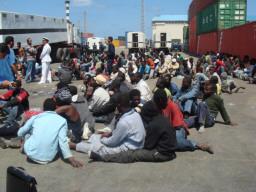The United Nations refugee agency UNHCR voiced concern on Tuesday over Italy's new policy of taking boat people intercepted in the Mediterranean back to Libya, saying it was endangering access to asylum in Europe.
It urged Italy to readmit anyone identified who meets requirements for asylum.
Spokesman Ron Redmond said the UNHCR's office in Rome had written to Premier Silvio Berlusconi's government to express serious concern over what it called a ''push-back'' policy.
The initiative ''undermines access to asylum in the European Union and carries with it the risk of violating the fundamental principle of non-refoulement which is enshrined in the 1951 (Geneva) Convention relating to the status of refugees and in EU law as well as in other instruments of international human rights law''.
Non-refoulement is a principle in international law, specifically refugee law, that concerns the protection of refugees from being taken back to countries where their lives or freedom could be threatened.
The UNHCR pointed out that ''the non-refoulement principle does not carry with it any geographical limitation. States are obliged to respect this principle wherever they exercise jurisdiction, including on the high seas''.
The UN agency stressed that Libya does not recognise the 1951 Convention ''and does not have a national asylum law or refugee protection system. There is, therefore, no assurance that people in need of international protection may find effective protection in Libya''.
Italy began its hard-line policy last week on the basis of a bilateral agreement with Libya - where most illegal immigrants set off for Italy and Malta.
The 2008 accord envisages that migrants rescued in international waters can be taken back to Libya, where humanitarian organisations can vet their asylum claims.
The agency, however, said that some migrants in Libyan detention centers, including refugees from Somalia and Eritrea, were seeking international protection and might be qualified for asylum.
It urged the Italian government to readmit any migrants sent back by Italy and identified by UNHCR with meeting these requirements.
Once in Italy, said Redmont, their refugee claims ''could then be determined in accordance with Italian law''.
The UNHCR first voiced its concern over Italy's new policy last Thursday, when Italian patrol boats rescued 230 migrants outside its territorial waters and took them to Libya.
A spokesman for UN Secretary-General Ban Ki-Moon said he ''backed'' the UNHCR's request for Italy to readmit migrants identified as meeting possible asylum requirements.
ITALY READY TO GRANT ASYLUM TO ANYONE WHO QUALIFIES, SAYS PM.
The Italian government insists it is not violating international laws by turning back illegal immigrants and Foreign Minister Franco Frattini said on Monday that the policy was in line with EU directives.
Frattini said that people seeking asylum or trying to flee violence-racked areas could do so by ''filing requests directly from their own countries or from transit countries''.
Berlusconi also defended the initiative, accusing criminal organisations of ''scientifically'' masterminding immigrant trafficking.
Speaking on the sidelines of an Italo-Egyptian summit in Sharm el Sheikh on Tuesday, the premier said the migrant-loaded boats trying to reach Italy's southern shores carried people ''singled out in a scientific manner by criminal organisations''.
''These people have paid to board the boat, they're not forced to leave their countries because they're victims of injustice. They're workers or unemployed people who are scientifically singled out by criminal organisations''.
''I don't like the word 'push-back', it's a matter of trying to prevent people who don't have the legal status from reaching Italy,'' said the premier, stressing that Italy is ''ready to provide hospitality to anyone who is forced to flee his country for fear of his life or freedom.
''I don't think there is anyone with the right to hospitality in Italy who can claim that he hasn't been welcomed''.
He also stressed that Interior Minister Roberto Maroni, who is tasked with implementing the new hard-line policy, was simply following his guidelines.
''I handled and signed the repatriation agreement with Libyan leader Moammar Gaddafi,'' said the premier, stressing that Maroni was doing his job.
Maroni firmed up the new policy last week after the latest in a string of disagreements with Malta over who should take migrants located in disputed waters.
Under the policy, which sees a key part of a landmark accord with Libya implemented for the first time, migrants are rescued in international waters and taken back to Libya where humanitarian organisations can vet their asylum claims.
Under the terms of the 2008 friendship and cooperation accord which resolves issues related to Italy's colonial occupation of the North African country, Italy will pay Libya $200 million over 25 years to fund various projects including the Italian construction of a coastal highway linking it with Egypt and Tunisia.
Rome will also clear Libya of landmines left from the colonial period.
As well as deportation at sea the deal also envisages joint patrols of Libya's shores, set to get underway soon.









